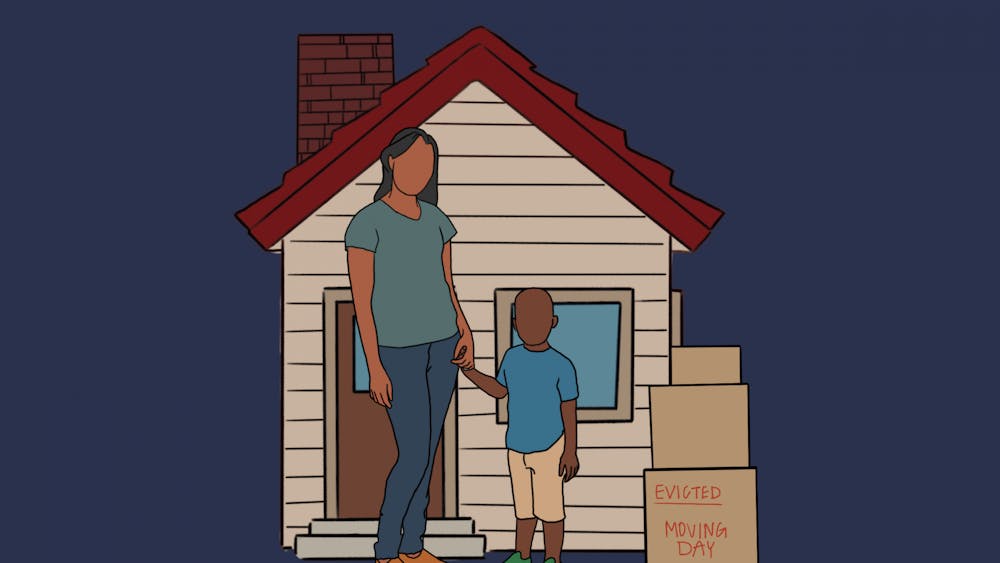Before students sign a lease, it is important for them to do their homework, IU Student Legal Services director Stacee Williams said.
“I think the most basic, fundamental thing students need to understand is that when they sign a lease contract, it is a binding contract and it is very difficult to get out of that agreement,” Williams said.
Student Legal Services provides confidential legal advice for students, and students’ activity fees cover its services.
For example, students can search for information on the property or landlords online, and they can come to Student Legal Services for lease analysis before they sign.
Most leases last for 10 to 12 months, so it helps to have an attorney review these contracts, Williams said. Going over a lease can help tenants prevent a bad experience with a landlord.
IU Student Legal Services also works closely with Bloomington’s Housing and Neighborhood Development department.
Students should look at HAND’s files on the property before renting, manager of rental inspections John Hewett said.
Every rental property in the city limits that is not owned by IU requires a rental occupancy permit from HAND, he said.
This means people can look at files for a property and know what problems it has had in the past before they decide to rent. It is free and only takes about 10 to 15 minutes.
“It’s really simple,” Hewett said. “Look at the file and make an informed decision on the property you are going to rent based on its history.”
Hewett said people sometimes make the mistake of signing the lease before taking a good look at the property.
Williams said it is important for tenants to inspect the property thoroughly before moving in. Tenants and landlords are required by local ordinance to conduct a joint move-in inspection.
During this inspection, tenants go throughout the rental property, make note of any problems and take pictures of the property to keep throughout the lease. It is important for tenants to keep a clear record of these issues to avoid being charged for problems that existed before they moved in, Williams said.
“One of the big rules in any contract work, but especially if you have someone difficult on the other side, is to make sure everything is put in writing,” Williams said.
One way to avoid issues with one’s landlord is through communication, even if it is an unpleasant experience, she said. If tenants do not notify landlords of problems, it is unlikely they will be required to address them.
A common issue students face when renting property is their choice of roommate, Williams said. Many rush to decisions without properly thinking it through, so IU Student Legal Services deals with many people who want help with a difficult roommate situation.
IU Student Legal Services is not allowed to represent one student against another, Williams said, so the actions a student can take in a situation like that are limited.
Hewett said renting off-campus properties is a learning experience for students.
“It’s learning to live on your own, learning how to deal with neighbors and housing experiences you are going to have to experience for the rest of your life,” Hewett said. “No matter where you live, you’re going to have neighbors and have things break.”
Breaking through the legal jargon:
Joint and several liability clauses
When tenants sign this clause, it means they are responsible for the entire amount due for that lease. Even if someone is signing with other people, he or she is individually agreeing to pay that amount. For example, if four people are renting a property for $2,000 a month, each tenant is responsible for that amount, instead of each person only being responsible for $500. This means even if one or more roommates move out, the remaining roommates would still be required to pay $2,000.
Indemnification clauses
This clause means landlords require tenants to exempt landlords from blame for problems that occur during the lease. If someone is injured at a party or someone falls down the stairs while intoxicated, the tenant is responsible, rather than the landlord. This can cause problems for tenants when an issue with the property, such as flooding making the property temporarily uninhabitable, occurs. Even if the tenants had to move out because of this, they would still be bound by the lease.
Attorney’s fees clauses
This clause makes the tenant responsible for an attorney’s fees if the landlord hires a lawyer for any reason. For example, if a tenant is disputing security deposit deductions with their landlord and they go to court to get back $200 they lost, they are taking a risk. If they lose, they might have to pay at least a couple thousand dollars in attorney fees in addition the $200 they lost. The renter would not have to pay these fees if they win the case.






